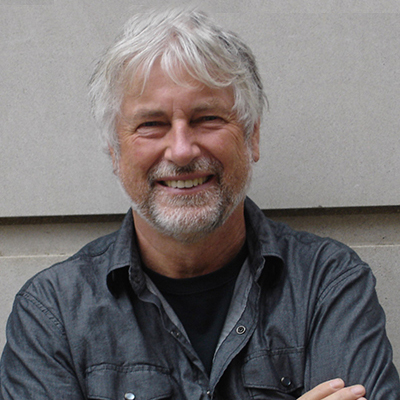Biography
Christopher Evans received his Ph.D. from Imperial College London, conducting his thesis research on endorphins and enkephalins, at the Medical Research Council Institute in Mill Hill. After a postdoctoral fellowship at Stanford University, Dr. Evans joined the UCLA faculty in the Department of Psychiatry and Biobehavioral Science. His research accomplishments have included identification of a number of novel endogenous opioid peptides and the cloning of the first opioid receptor. Dr. Evans was Director of the UCLA Brain Research Institute from 2004-2017 and is the Stefan Hatos Professor directing the Shirley and Stefan Hatos Center for Neurophamacology in the UCLA Semel Institute. Dr. Evans is also director of a NIH-funded center – The Center for Opioid Receptors and Drugs of Abuse or CSORDA. CSORDA, with continuous NIH funding for over 30 years. The aims of CSORDA are to understand the action of opioid drugs such as morphine and heroin at the molecular, cellular and behavioral levels.
Publications
View a up-to-date publication list: https://pubmed.ncbi.nlm.nih.gov/collections/48826753/?sort=date
A selected list of publications:
Williams John T, Ingram Susan L, Henderson Graeme, Chavkin Charles, von Zastrow Mark, Schulz Stefan, Koch Thomas, Evans Christopher J, Christie Macdonald J
Regulation of μ-opioid receptors: desensitization, phosphorylation, internalization, and tolerance Pharmacological reviews, 2013; 65(1): 223-54.
Romero-Calderón Rafael, O’Hare Elizabeth D, Suthana Nanthia A, Scott-Van Zeeland Ashley A, Rizk-Jackson Angela, Attar Aida, Madsen Sarah K, Ghiani Cristina A, Evans Christopher J, Watson Joseph B
Project brainstorm: using neuroscience to connect college students with local schools PLoS biology, 2012; 10(4): e1001310.
Evans Christopher J, Chiou Chiun-Fang, Fitzgerald Kristina A, Evans William J, Ferrell Betty R, Dale William, Fried Linda P, Gandra Shravanthi R, Dennee-Sommers Brooke, Patrick Donald L
Development of a new patient-reported outcome measure in sarcopenia Journal of the American Medical Directors Association, 2011; 12(3): 226-33.
Brubaker Linda, Khullar Vik, Piault Elisabeth, Evans Christopher J, Bavendam Tamara, Beach James, Yeh Yating, Kopp Zoe S, Kelleher Con J, Trocio Jeffrey
Goal attainment scaling in patients with lower urinary tract symptoms: development and pilot testing of the Self-Assessment Goal Achievement (SAGA) questionnaire International urogynecology journal, 2011; 22(8): 937-46.
Escande-Beillard Nathalie, Washburn Lorraine, Zekzer Dan, Wu Zhongqi-Phyllis, Eitan Shoshy, Ivkovic Sonja, Lu Yuxin, Dang Hoa, Middleton Blake, Bilousova Tina V, Yoshimura Yoshitaka, Evans Christopher J, Joyce Sebastian, Tian Jide, Kaufman Daniel L
Neurons preferentially respond to self-MHC class I allele products regardless of peptide presented Journal of immunology (Baltimore, Md. : 1950), 2010; 184(2): 816-23.
Walwyn, W. M. Keith, D. E., Jr. Wei, W. Tan, A. M. Xie, C. W. Evans, C. J. Kieffer, B. L. Maidment, N. T.
Functional coupling, desensitization and internalization of virally expressed mu opioid receptors in cultured dorsal root ganglion neurons from mu opioid receptor knockout mice Neuroscience, 2004; 123(1): 111-21.
Eitan, S. Bryant, C. D. Saliminejad, N. Yang, Y. C. Vojdani, E. Keith, D., Jr. Polakiewicz, R. Evans, C. J.
Brain region-specific mechanisms for acute morphine-induced mitogen-activated protein kinase modulation and distinct patterns of activation during analgesic tolerance and locomotor sensitization J Neurosci, 2003; 23(23): 8360-9.
Lutfy, K. Eitan, S. Bryant, C. D. Yang, Y. C. Saliminejad, N. Walwyn, W. Kieffer, B. L. Takeshima, H. Carroll, F. I. Maidment, N. T. Evans, C. J.
Buprenorphine-induced antinociception is mediated by mu-opioid receptors and compromised by concomitant activation of opioid receptor-like receptors J Neurosci, 2003; 23(32): 10331-7.
Reeve, J. R., Jr. Keire, D. A. Coskun, T. Green, G. M. Evans, C. Ho, F. J. Lee, T. D. Davis, M. T. Shively, J. E. Solomon, T. E.
Synthesis of biologically active canine CCK-58 Regul Pept, 2003; 113(1-3): 71-7.
Zaki, P. A. Keith, D. E., Jr. Thomas, J. B. Carroll, F. I. Evans, C. J.
Agonist-, antagonist-, and inverse agonist-regulated trafficking of the delta-opioid receptor correlates with, but does not require, G protein activation J Pharmacol Exp Ther, 2001; 298(3): 1015-20.
Rabizadeh, S. Ye, X. Sperandio, S. Wang, J. J. Ellerby, H. M. Ellerby, L. M. Giza, C. Andrusiak, R. L. Frankowski, H. Yaron, Y. Moayeri, N. N. Rovelli, G. Evans, C. J. Butcher, L. L. Nolan, G. P. Assa-Munt, N. Bredesen, D. E.
Neurotrophin dependence domain: a domain required for the mediation of apoptosis by the p75 neurotrophin receptor J Mol Neurosci, 2000; 15(3): 215-29.
Keith, D. E. Anton, B. Murray, S. R. Zaki, P. A. Chu, P. C. Lissin, D. V. Monteillet-Agius, G. Stewart, P. L. Evans, C. J. von Zastrow, M.
mu-Opioid receptor internalization: opiate drugs have differential effects on a conserved endocytic mechanism in vitro and in the mammalian brain Mol Pharmacol, 1998; 53(3): 377-84.
Sternini, C. Spann, M. Anton, B. Keith, D. E., Jr. Bunnett, N. W. von Zastrow, M. Evans, C. Brecha, N. C.
Agonist-selective endocytosis of mu opioid receptor by neurons in vivo Proc Natl Acad Sci U S A, 1996; 93(17): 9241-6.
Zhu, J. Yin, J. Law, P. Y. Claude, P. A. Rice, K. C. Evans, C. J. Chen, C. Yu, L. Liu-Chen, L. Y.
Irreversible binding of cis-(+)-3-methylfentanyl isothiocyanate to the delta opioid receptor and determination of its binding domain J Biol Chem, 1996; 271(3): 1430-4.
Tian, J. Clare-Salzler, M. Herschenfeld, A. Middleton, B. Newman, D. Mueller, R. Arita, S. Evans, C. Atkinson, M. A. Mullen, Y. Sarvetnick, N. Tobin, A. J. Lehmann, P. V. Kaufman, D. L.
Modulating autoimmune responses to GAD inhibits disease progression and prolongs islet graft survival in diabetes-prone mice Nat Med, 1996; 2(12): 1348-53.
Roth, K. A. Makk, G. Beck, O. Faull, K. Tatemoto, K. Evans, C. J. Barchas, J. D.
Isolation and characterization of substance P, substance P 5-11, and substance K from two metastatic ileal carcinoids Regul Pept, 1985; 12(3): 185-99.
Weber, E. Esch, F. S. Bohlen, P. Paterson, S. Corbett, A. D. McKnight, A. T. Kosterlitz, H. W. Barchas, J. D. Evans, C. J.
Metorphamide: isolation, structure, and biologic activity of an amidated opioid octapeptide from bovine brain Proc Natl Acad Sci U S A, 1983; 80(23): 7362-6.





